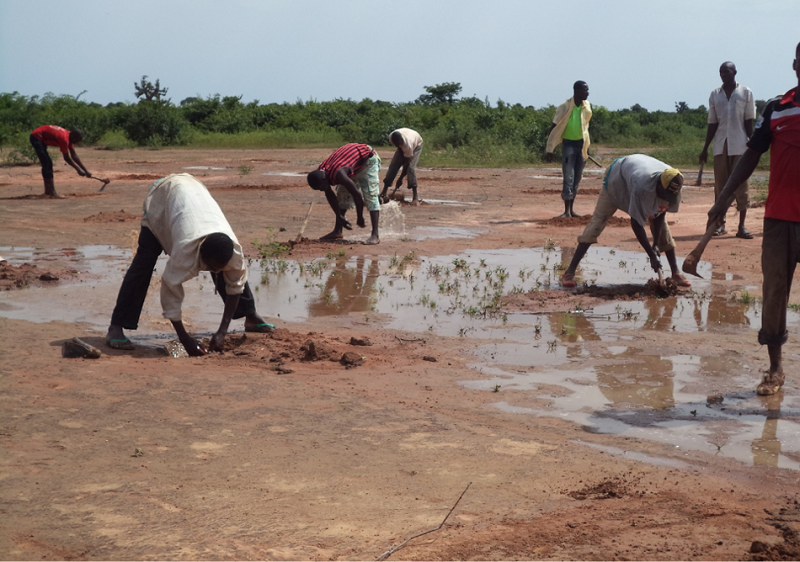Preparing communities to face future disasters and adapt to climate change
The theme of this year´s International Day for Disaster Risk Reduction is “International cooperation for developing countries to reduce their disaster risk and disaster losses”. With the latest Intergovernmental Panel on Climate Change (IPCC) report predicting significantly increasing risks of extreme weather events and other natural and man-made hazards, delivering on the Sendai Framework for Disaster Risk Reduction (DRR) and the political commitments made in 2015 is ever more urgent. While the EU already supports DRR through its international cooperation, more could be done through an ambitious implementation of the new Global Europe Instrument.
Around the world, National Red Cross and Red Crescent Societies are scaling up their climate-smart disaster risk reduction, early action and preparedness activities. They are supporting communities to be better prepared to manage forecasted weather events and new climate extremes, including by being able to access resources ahead of their impact.
Early action saves lives. In Niger , the Red Cross Society of Niger and the French Red Cross are using the forecast-based financing approach to reduce the food insecurity and nutrition crisis caused by drought. Forecast-based financing enables access to humanitarian funding for early action to prepare for extreme weather events based on meteorological forecast information, combined with risk analysis. By anticipating potential disasters, preparedness and mitigation activities help to strengthen food security in the region and lessen human suffering and losses.
Ensuring the resilience of livelihoods and preserving natural resources are crucial. In Sudan, the Sudanese Red Crescent is working with the Red Cross Societies of the Netherlands, Denmark, Spain, and Sweden on a climate change adaptation project which aims to strengthen community resilience through improved natural resource management. With the help of local populations, subsurface dams are being constructed and fire lines created to avoid losing more grazing land to wildfires and to reduce the threat of desertification in high-risk areas. As climate change drives higher temperatures and increases the variability of rainfall, the already long dry season has become even longer. By increasing water accessibility and availability, project activities reduce the impacts of climate change and contribute to improved natural resource management.

Ecosystem-based DRR must be scaled up. The degradation of ecosystems – such as forests, wetlands, coastal and marine systems, and drylands – is a major driver of disaster risk and a key component of disaster vulnerability. By systematically harnessing the regulatory functions of ecosystems, ecosystem-based DRR approaches not only mitigate, prevent and buffer against disasters, but also offer other services of productive and cultural value. In collaboration with UN Environment, Partners for Resilience (PfR), an alliance of five organisations, including the Netherlands Red Cross and the Red Cross Red Crescent Climate Centre, aim to develop different models for the large-scale implementation of Eco-DRR. Activities will cover Indonesia, India, Uganda, Ethiopia and Haiti, and rolled out across broader landscapes to demonstrate the full potential of Eco-DRR and create and document models for scaling-up community-based eco-DRR.
Ensuring cooperation with local authorities and other local actors is key for effective disaster preparedness. To reduce the gap between an emergency call and the arrival of rescue units in remote villages, the Armenian Red Cross and the Austrian Red Cross have been cooperating with the national Ministry of Emergency Situations to develop a model for Volunteer Fire and Rescue Groups as emergency first responders. In parallel with the district/province fire and rescue services, these groups can be activated for all emergency response operations within their village cluster by the ministry’s emergency call and dispatch centres. In Nepal, the Nepal Red Cross Society and the Danish Red Cross have established community-based emergency response teams who practice rescue and first aid skills together with other local actors. Along with the Nepal armed police force, Red Cross volunteers are preparing for water rescue in the event of flooding. They are also learning how to set up evacuation sites as part of anticipatory actions in the event of disasters.
While these efforts are made on the ground, there is an urgent need for additional support from the international community to expand anticipatory action and reduce disaster risks and losses worldwide. Without further engagement on climate in the coming years, the crisis will be overwhelming, especially for developing countries. Increased cooperation, as well as investments in DRR and capacity building, are key to creating more resilient societies.
The EU can play an important role in reducing disaster risks and preventing losses by strengthening the focus on DRR in its external action, including through the European Green Deal and the new EU Adaptation Strategy, adopted earlier this year. For these efforts to reach the most vulnerable communities and leave no one behind, it will be crucial for more support to be channelled to local actors, like National Red Cross and Red Crescent Societies, who are already present and engaged within local communities. Given the variety of extreme weather events and other natural and man-made disasters which could strike communities, any preparedness and adaptation measures need to be tailored to the local context.
Ahead of COP26, the International Federation of Red Cross and Red Crescent Societies (IFRC) has launched #ClimateChangedMe campaign to draw attention to the climate crisis and the urgency of acting now. Learn more at climatechanged.me
Read more about the International Red Cross and Red Crescent Movement, Ambitions to address the climate crisis.
For media inquiries, please contact Eva Oyón on: eva.oyon@redcross.eu or +32 2 235 09 22

